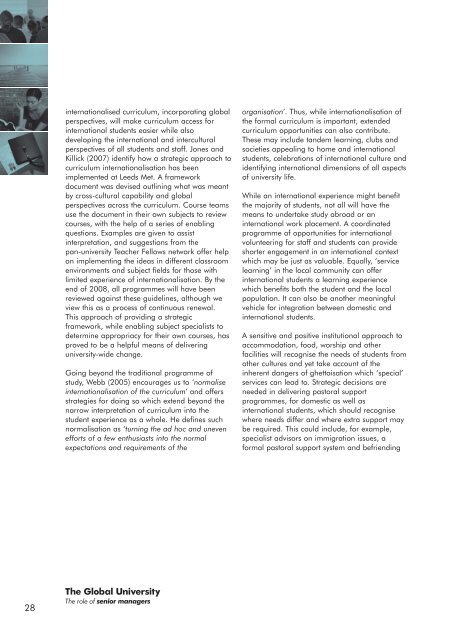HE senior mgrs_Apr18 - Bournemouth University
HE senior mgrs_Apr18 - Bournemouth University
HE senior mgrs_Apr18 - Bournemouth University
Create successful ePaper yourself
Turn your PDF publications into a flip-book with our unique Google optimized e-Paper software.
internationalised curriculum, incorporating globalperspectives, will make curriculum access forinternational students easier while alsodeveloping the international and interculturalperspectives of all students and staff. Jones andKillick (2007) identify how a strategic approach tocurriculum internationalisation has beenimplemented at Leeds Met. A frameworkdocument was devised outlining what was meantby cross-cultural capability and globalperspectives across the curriculum. Course teamsuse the document in their own subjects to reviewcourses, with the help of a series of enablingquestions. Examples are given to assistinterpretation, and suggestions from thepan-university Teacher Fellows network offer helpon implementing the ideas in different classroomenvironments and subject fields for those withlimited experience of internationalisation. By theend of 2008, all programmes will have beenreviewed against these guidelines, although weview this as a process of continuous renewal.This approach of providing a strategicframework, while enabling subject specialists todetermine appropriacy for their own courses, hasproved to be a helpful means of deliveringuniversity-wide change.Going beyond the traditional programme ofstudy, Webb (2005) encourages us to ‘normaliseinternationalisation of the curriculum’ and offersstrategies for doing so which extend beyond thenarrow interpretation of curriculum into thestudent experience as a whole. He defines suchnormalisation as ‘turning the ad hoc and unevenefforts of a few enthusiasts into the normalexpectations and requirements of theorganisation’. Thus, while internationalisation ofthe formal curriculum is important, extendedcurriculum opportunities can also contribute.These may include tandem learning, clubs andsocieties appealing to home and internationalstudents, celebrations of international culture andidentifying international dimensions of all aspectsof university life.While an international experience might benefitthe majority of students, not all will have themeans to undertake study abroad or aninternational work placement. A coordinatedprogramme of opportunities for internationalvolunteering for staff and students can provideshorter engagement in an international contextwhich may be just as valuable. Equally, ‘servicelearning’ in the local community can offerinternational students a learning experiencewhich benefits both the student and the localpopulation. It can also be another meaningfulvehicle for integration between domestic andinternational students.A sensitive and positive institutional approach toaccommodation, food, worship and otherfacilities will recognise the needs of students fromother cultures and yet take account of theinherent dangers of ghettoisation which ‘special’services can lead to. Strategic decisions areneeded in delivering pastoral supportprogrammes, for domestic as well asinternational students, which should recognisewhere needs differ and where extra support maybe required. This could include, for example,specialist advisors on immigration issues, aformal pastoral support system and befriending28The Global <strong>University</strong>The role of <strong>senior</strong> managers





![[2012] UKUT 399 (TCC)](https://img.yumpu.com/51352289/1/184x260/2012-ukut-399-tcc.jpg?quality=85)




![Neutral Citation Number: [2009] EWHC 3198 (Ch) Case No: CH ...](https://img.yumpu.com/50120201/1/184x260/neutral-citation-number-2009-ewhc-3198-ch-case-no-ch-.jpg?quality=85)





